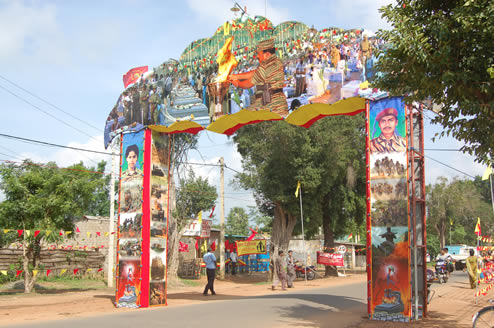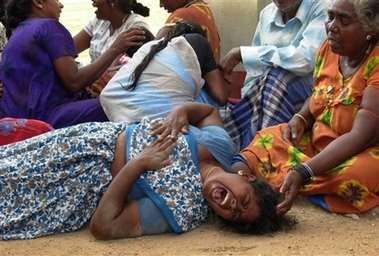A Final Verdict on Tamil Eelam?
by Dr. Chandra Bose, TamilCanadian.com
|
Given the above, why shouldn't Tamils have a separate state? The destiny of Tamils is in the hands of Tamils and not in the hands of the Sinhalese, Americans or those in the Indian establishment.
|

Heroes' Day arch, Nov. 27, 2006 (photo courtesy TamilNet) |
Was Vellupillai Prabahkaran's Heroes' Day message/address a final and decisive pronouncement on the future trajectory of Tamil Eelam, or was it an address couched in ambiguity without any sense of direction for the resolution of the Tamil national question? While the Sinhala establishment dismissed the speech as something expected or nothing unusual, others within the establishment have taken a serious view of the speech. On the side of Tamils, those with liberal pretensions think that, although the speech points in the direction of a future state for Tamils, they think that Tamil Eelam might not become a reality. However, for Tamils who have stood thick and thin throughout the long years of the liberation struggle, Prabahkaran's speech is full of meaning and it takes the struggle one stage higher—for the eventual creation of an independent Tamil Eelam.
I think that Prabahkaran's Heroes' Day address is a kind of final pronouncement, a sort of direction for the achievement of an independent state of Tamil Eelam.
The idea of independence is, of course, nothing new in the long years of the struggle of the national liberation movement, but this ultimate objective was set aside to provide time and space for the Sinhala establishment and the international community to accommodate the legitimate aspirations of Tamils. However, despite the patience of the LTTE, the Sinhala establishment has proven beyond reasonable doubt that it is not interested in addressing Tamil aspirations, but rather it wants to adopt the military option to subdue and enslave the Tamils, a move supported by some members of the international community. Given this unchanging situation, Prabahkaran has decided he has no choice, but to take the struggle of the Tamils to another level.
What is the backdrop to Prabahkaran's Heroes' Day address?

Ethnic Tamil woman Muniyan Kajawarnam, left, cries after identifying the body of her nephew Karmehan Ganeshabala, not seen, in Trincomalee, about 220 kilometers (138 miles) northeast of Colombo, Sri Lanka on Tuesday, Dec. 5, 2006. Ganeshabala was shot and killed by unidentified gunmen in a busy street in Trincomalee. (AP Photo/Mangalanath)
, |
From a national perspective, the speech tells the Tamils that nothing concrete could be expected from the Sinhala establishment or the international community. Although the LTTE gave Mahinda Rajapakse about a year to come up with proposals to address the legitimate grievances of Tamils, the Sinhala establishment alternatively sought to deal with the Tamil question by military means. While the Ceasefire Agreement held for a while, the military atrocities committed by the Sri Lankan armed forces, together with the paramilitaries, on innocent Tamils forced the LTTE to adopt defensive means.
The Ceasefire Agreement now only exists on paper, as a monumental disaster has befallen Tamils in the northeast as result of the inhuman atrocities committed by the Sinhala establishment on innocent Tamils. In the Sinhala establishment's genocidal war, Tamils face the prospect of total annihilation.
The international community has played a positive role in bringing about peace in places like Sudan, Northern Ireland, Aceh and in many other places of intensive conflict. However, in the case of Sri Lanka, the international community has openly sided with the war efforts of the Sri Lankan government, on the grounds that the LTTE is a "terrorist organization."
This is despite the fact that the LTTE has made many friendly overtures to the international community to address the Tamil national problem. Given the biased nature of the international community, Tamils can expect little or nothing from it. Sometimes, in the resolution of both external and internal conflicts, a strong hegemon is necessary. A strong hegemon either in the form of a superpower or ,collectively, in the form of an international community has the legitimacy and power to provide a solution by advising and regulating the behaviour of parties to conflicts.
In the case of Sri Lanka, the hegemon in the form of the international community has failed miserably to address the legitimate grievances of the Tamils. By openly siding with the Sinhala establishment, the international community has lost its moral role in the conflict. In this respect, one can hardly blame the LTTE for moving in the direction of a separate state.
Whatever the role of the international community in general and of the Americans in particular, an amicable solution to the conflict in Sri Lanka can come by way of India's role. As a regional hegemon, India has the capacity and will to bring about a negotiated settlement. However, under the Congress Party, the Indian government remains somewhat in a state of paralysis to act decisively to tame the Sri Lankan state. This is despite the fact that there is evidence that Pakistan, China and the U.S. are bent on challenging the strategic and geopolitical interests of India in the region. It is not that India cannot act decisively, but the nature of the government, the role of Sonia Gandhi in pandering to the interests of the Americans, the lack of proper advisors to the government and the legacy of India's relations with Tamils in Sri Lanka are proving to be obstacles for a major revision of India's foreign policy towards Sri Lanka.
While New Delhi might not do anything worthwhile to address the grievances of Tamils in Sri Lanka, there is a good possibility that politics in Tamil Nadu might change for the better. It is generally believed that politics in Tamil Nadu has changed somewhat to sustain the Tamil cause in Sri Lanka. The recent protests waged by Tamils cutting across party lines demonstrate that Tamils in India are taking an active interest in the welfare and well-being of the Tamils in Sri Lanka. Although the Indian government has not responded to the atrocities committed by the Sinhala state on Tamils, Tamil politicians in the south have made some strong moves.
Following the recent address by Prabahkaran, Chief Minister of Tamil Nadu Karunanthi commented that he was in favour of a separate state for Tamils in Sri Lanka, immaterial of how it was obtained. Such a statement by Karunanthi was unthinkable a few weeks back, but the mood has definitely changed with the possible effect of altering the larger contours of the Indian government's overall policy towards Tamils in Sri Lanka. Moreover, recent criticisms by Vaiko Gopalswamy against some foreign policy advisors of the Indian government on the Sri Lankan issue suggest that policy alterations might be in the offing. Anyway, we will have to wait and see.
The US might be making lots of noises in criticizing the LTTE, but the fact remains that in terms of regional power politics, India has a major say on what might eventually transpire in Sri Lanka. While India might not be favourably disposed to the LTTE for obvious reasons, the fact remains that when it comes to regional geo-politics, India has to decide whether the Sri Lankan state favours India's larger role.
My recent discussions with some members of the Indian political and military establishments suggest that India has little or no trust in the Sri Lankan state. While India does not want to upset the already established status-quo, it is not totally averse at some point to working out a strategy for Tamils in consultation with the Tamil Nadu government. So, in this respect, while there might not be a direct Indian intervention to address the ethnic conflict in Sri Lanka, a Tamil Nadu-sponsored initiative might provide an opportunity for the creation of a separate state for Tamils.
Apart from the internal, international and regional factors, Prabahkaran's speech takes cognizance of the advances that the LTTE has made in building up a powerful army, navy and an air force as the armour for the protection and advancement of Tamil rights. Without this coercive force, Tamils would have no chance against the superior and well-armed Sri Lankan armed forces. However, thanks to years of training, commitment, dedication and the support of Tamils, the LTTE is not just a guerilla force. It has conventional strengths and is in a position to take on the Sri Lankan armed forces with the chance of beating them severely, as recent and past events have indicated. Beyond this, the LTTE has been engaged in the process of state-building for many years and, as a result, has created a number of institutions that are essential in state-building and serving the needs of the people.
The state-building process could not have taken shape in the absence of definite territorial possessions. It is well known that the LTTE controls nearly 80 percent of the traditional Tamil areas or homeland. There is virtually a defacto state and it is only international legitimation that is needed to turn this defacto state into a de jure one. There are also discussions within the LTTE circles that, at some point, it should implement the provisions of the Interim Self-Governing Authorityl proposal in a unilateral manner, as the Sri Lankan state has refused to have discussion over this proposal that was submitted in late 2003.
Given the above, why shouldn't Tamils have a separate state? The destiny of Tamils is in the hands of Tamils and not in the hands of the Sinhalese, Americans or those in the Indian establishment. It is the fundamental right of the LTTE, being the sole representative of Tamils, to pursue the option of a separate Tamil Eelam, simply because there is not one iota of a chance for a negotiated settlement. The Sinhala state lacks the capacity, will and the intellect to provide a far-reaching accommodation for Tamils. It is more used to finding ways and means to impose the most obnoxious collective punishment on Tamils based on their own historical myths. It is not for the Sinhalese or Americans to tell Tamils what they should do, it is only right for the LTTE to take what rightfully belongs to Tamils. There is no two ways about it.
Let us not squabble; let us move in the direction of a new future.
|
 Home
Home Archives
Archives Home
Home Archives
Archives